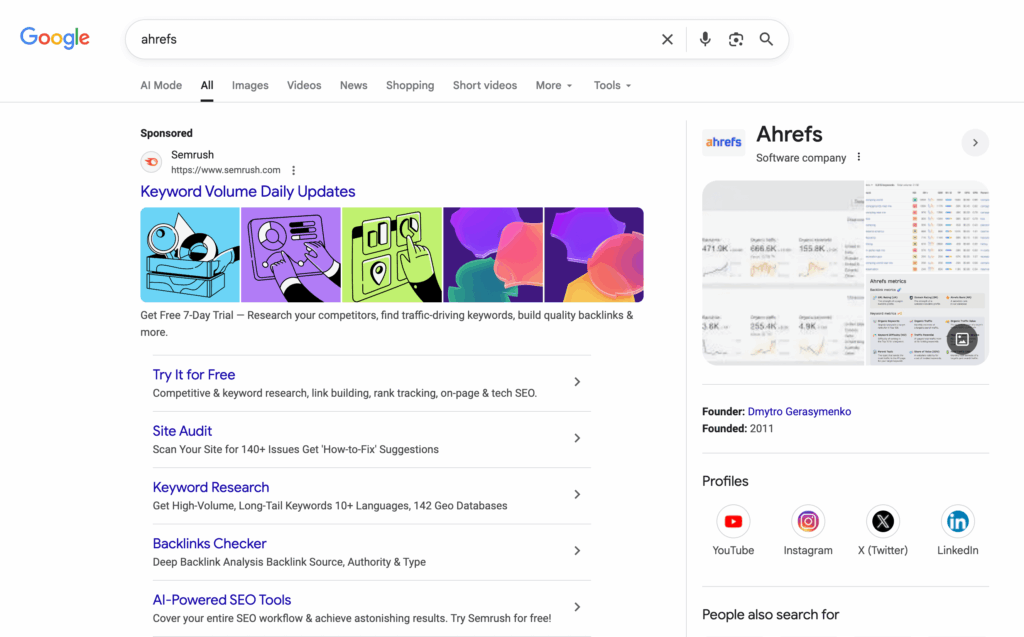Have you ever searched your own brand just to find that your competitor is the first result on Google? This is an incredibly frustrating scenario because your brand is one of your most valuable assets. While this situation is frustrating, it is a popular bidding strategy.
Bidding on competitors’ keywords is a PPC strategy that allows you to profit from your competitors’ brand, but it may not always be the right approach. There are also a few legal implications that could arise when bidding on competitors’ branded keywords. Before you start bidding on your competitor’s branded keywords, it’s essential to understand the difference between branded and unbranded keywords, what brand bidding entails, and the pros and cons of bidding on competitors’ brand keywords.
Important Things to Know Before Bidding on Competitors’ Keywords
Branded vs Non-Branded Keywords
The difference between branded and non-branded keywords is significant when considering whether to bid on competitors’ branded keywords.
Non-branded keywords are broad keywords that describe the category as a whole. An example of a non-branded keyword would be “men’s running shoes” or “trail running shoes”. These keywords are broader and appeal to a larger audience, typically at the top of the marketing funnel. These keywords are usually more competitive because of the larger audience and, in turn, are more expensive to place ads on.
Branded keywords are specific keywords that include a company’s name. Going back to our running shoe example, branded keywords would be something like “Nike running shoes” or “Adidas running shoes”. These keywords are much more specific and mainly appeal to users who are towards the bottom of the sales funnel, meaning that they are more likely to purchase. Since this audience is smaller and tends to be searching for exactly what they want, these keywords are usually less competitive. Since these users have clear search intent and know what they are looking for, these keywords typically have a higher conversion rate than the broad, non-branded keywords.
What is Brand Bidding?
To understand if bidding on your competitor’s branded keywords is a good idea, you first must understand the basics of brand bidding. Brand bidding is a paid advertising strategy that involves bidding on your own brand name or your competitor’s brand name as a search keyword to increase ad visibility for your pay-per-click (PPC) campaign. Bidding on your own brand name can be an effective strategy to totally dominate the search engine results page (SERP) and control the messaging around your brand. Bidding on a competitor’s brand name would result in a SERP like this one that popped up when I was searching for Ahrefs, a marketing platform, and was served an ad for their competitor SEMRush:

Benefits of Bidding on Competitor Brand Keywords
There are a few benefits that come from bidding on your competitor’s keywords. The first pro is the lower cost-per-click (CPC) that is associated with the branded keyword. As stated earlier, branded keywords have less competition and, in turn, are cheaper.
Another pro is that since these words have such a high search intent, they also have a higher click-through rate (CTR). If your ads are able to capitalize on this higher CTR, you will obviously see greater traffic and hopefully more conversions.
The last pro is that your brand will gain visibility on your competitor’s SERP. This can be especially useful if you are a new entrant to the industry and want to gain brand awareness. This can also be a great last-ditch effort to get customers to go with you when they are in the later stages of the purchasing process.
Risks of Bidding on Competitor Brand Keywords
While there are a few benefits associated with bidding on competitors’ keywords, there are also risks associated with this strategy. The first risk that comes with brand bidding on competitors’ keywords is the potential legal implications associated with the strategy. Although it is completely legal to bid on your competitor’s trademarked term as a keyword, it is illegal to use any trademarked material in the ad itself. To avoid trademark infringement, you must avoid using a competitor’s brand name, logo, or slogan in your ad’s headline, description, or display URL. A good general rule of thumb is to make sure that your ad has nothing that could confuse a consumer into thinking that you are your competitor.
The next risk that brand bidding on your competitor’s keywords opens you up to is the risk of starting a bidding war with your competitor. Bidding on your competitor’s keyword will likely end with some sort of retaliation action from them. This could either be them bidding on their own keyword to drive up the price, or them starting to bid on your keywords. If you do decide to target one of your competitors, make sure you aren’t picking a fight with a company with deeper pockets than you. If you do, they could wage a bidding war on all of your keywords and make it hard for you to protect your own brand.
The last risk that brand bidding on your competitor’s keyword opens you up to is possibly negative brand perception from users. As stated earlier, these branded searches have a higher search intent, meaning that these users are searching for the exact brand they have searched for. This means they know exactly what they want, and seeing your brand pop up as the first result could annoy them and soil their opinion on your brand.
When does it make sense to use this strategy?
Now that you understand the benefits and risks attached to this strategy, here are some situations in which you might employ this strategy:
- When competitors are consistently bidding on your branded keywords. This strategy can be an effective retaliation when your competitors are bidding on your keywords. This shows that you are willing to fight for your own branded keywords and will start a bidding war that hopefully ends with both parties removing opposing ads to cut costs.
- When you are a new brand entering a competitive market. If you are entering a competitive market, this strategy can be an effective way to gain brand recognition among customers who are already familiar with the industry. This can be a cheaper strategy if you don’t have the budget to gain brand awareness through bidding on the broader keywords in your industry.
- When you are competing with large market leaders. If you find yourself in a David vs Goliath situation in your industry, it makes sense for you to try and steal a piece of their market share by bidding on their branded keywords. If you can meet these bottom-of-the-funnel customers close to the point of purchase with a compelling alternative to your competitor, you will be able to start carving a portion of their market share for yourself.
Best Practices for Bidding on Competitor’s Brand Name
If you and your team decide that bidding on your competitor’s brand name is the best course of action, here are the best practices to make sure your ads are ethical and keep you out of legal hot water.
Make sure your ads are in compliance with Google’s policies on trademarks. Google provides clear policies on trademarks in the Advertising Policies Help section of their support site. This is a comprehensive guide as to what Google Ads will and will not restrict in terms of trademark use in ads. It is important to adhere to these policies for legal reasons, but also because if Google finds you in violation of these policies, they will suspend your account immediately.
Clearly set your brand apart in ad copy. When writing ad copy for these bids, make sure that you are providing a unique value proposition to your potential customers. Gear the ad copy towards reasons why consumers should choose you over your competitor without using their brand name.
Be sure to set budget caps on these bids to prevent overspending. This is a good rule of thumb for any PPC campaign, but especially for these types of brand bidding campaigns. As stated earlier, these campaigns run the risk of your competitor retaliating by starting a bidding war on these words, driving up the price. With these budget caps in place, you will be able to limit spending, protecting your bottom line from these types of retaliatory actions.
Monitor competitor responses. It is important that if you are deciding to run these types of campaigns, you monitor your competitors’ response closely. Be sure to check to see if they have started bidding on the word to drive up the price, or if they have started bidding on your branded keywords.
How to Check if a Competitor is Bidding on Your Branded Keywords
We have covered all the pros, cons, and best practices if you decide to bid on a competitor’s brand, but how can you tell if a competitor is running ads on your keywords? There are a few free and paid ways to check to see if competitors are advertising on your branded keywords.
The first free way to check is by manually searching for your brand and seeing if a competitor’s ad is served to you. The second free way to check is through the Google Ads Auction Insights Report. This is a report that you can find inside your Google Ads account that will provide you with data on which advertisers are bidding on the same terms as you. The third way to check is through a paid service like SEMRush, Ahrefs, or Adthena. SEMRush and Ahrefs provide reports and insights as to the ads your competitors are running, as well as the keywords they are bidding on. Adthena is a paid service that automatically detects when a competitor is bidding on your branded terms and checks the ad copy to see if any trademark infringement has occurred.
What should you do if a competitor is bidding on your brand?
There are three ways to approach these types of situations.
- Start bidding on your own brand to protect it. When you bid on your own brand name, you completely control the messaging surrounding your brand. If your competitor is bidding on your brand, this is an effective defense to either take back control of your branded SERP or to at least drive up the price on the word so that hopefully your competitor abandons the bids.
- Start bidding on your competitor’s brand. Bidding on your competitor’s brand will raise the price on their keywords, starting a bidding war. Hopefully, this will incentivize your competitor to retreat and pull the ads on your branded keywords. This defense only works if you are picking a fight with a competitor that is similar in size to your company, and it will not work if you are getting into a bidding war with a company with deeper pockets.
- Check for trademark infringement. When you find out that a competitor is running ads on your branded keywords, the first thing you should check for is any trademark violations. If you find that they have violated the search engine’s policies, report the ad to get it removed.
FAQs
What is Brand Bidding?
Brand bidding is a paid advertising strategy that involves bidding on your own brand name or your competitor’s brand name as a search keyword to increase ad visibility for your pay-per-click (PPC) campaign.
What is the difference between branded and non-branded keywords?
Branded keywords are specific keywords that include a company’s name, like “Ben & Jerry’s ice cream”, while non-branded keywords are broad, generic keywords that describe the category as a whole, like “chocolate chip ice cream”.
Can you bid on competitor terms?
Google has made it very clear that you are completely allowed to bid on your competitor’s brand name as a keyword. As long as you don’t violate your competitor’s trademark in your ad copy, you are completely allowed to bid and advertise on your competitor’s brand name.
Should I bid on my own brand name?
It is a great idea to bid on your own brand name. Doing this will allow you to dominate the messaging on your brand’s SERP and dictate what potential customers see about your brand.
Is it legal to bid on your competitor's name as a keyword?
It is 100% legal to bid on and advertise on your competitor’s brand name as a keyword. However, it is illegal to use a competitor’s brand name, logo, or slogan in your ad’s headline, description, or display URL.
Key Takeaways
Now that you know the difference between branded and non-branded keywords, the basics and pros and cons of brand bidding, and when it makes sense to bid on your competitor’s keywords, you have all the knowledge needed to decide if this strategy makes sense for your brand.
If you do decide to bid on your competitor’s brand name, be sure to: avoid trademark violations in your ad copy, clearly set your brand apart in your ad copy, set budget caps to prevent overspending, and monitor your competitor’s response.
Be sure to regularly check to see if any competitors are bidding on your branded keywords. If you find competitors are doing this, be sure to check and see if they are violating your trademarks. If they are, report the ad and get it taken down. If they are not, discuss with your team and find the proper retaliation strategy for you.






